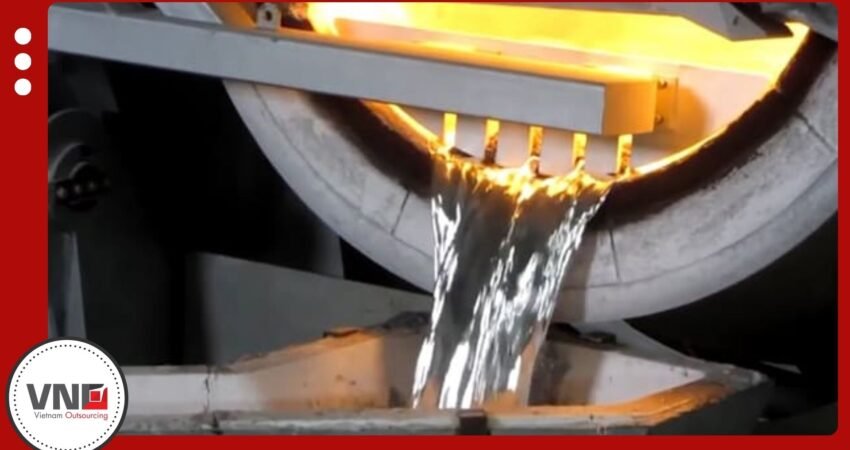- September 8, 2025
- Daniel Pham
Aluminum Process and Technique (2025 Guide)
Table of Contents
Aluminum in Vietnam is increasingly important for global supply chains. To begin with, aluminum is lightweight, versatile, and durable, making it essential for construction, aerospace, automotive, energy, and electronics. Moreover, with the global move toward sustainability and lightweight design, aluminum’s role will only expand. As a result, industries worldwide rely on aluminum as a smart solution for innovation and efficiency.
At Vietnam Outsourcing (VNO), we link U.S. and EU buyers with reliable Vietnamese suppliers who specialize in advanced aluminum processes. Because of this, buyers gain direct access to trusted factories, cost savings, and consistent quality. In the end, this knowledge helps businesses stay competitive in global markets. For deep insight of Vietnamese market, you might want to read aluminum manufacturing in Vietnam
Aluminum: Properties and Significance
-
Appearance: Bright silver-white metal
-
Melting Point: ~1,220°F (660°C)
-
Density: 2.7 g/cm³
-
Abundance: ~8.1% of Earth’s crust, the most common metal element
-
Key Advantages: Lightweight, corrosion-resistant, recyclable, and easy to alloy
One of aluminum’s most unique qualities is its natural oxide layer, which forms instantly when exposed to air. Therefore, aluminum resists corrosion and gains long-term durability. Consequently, it has become vital for aerospace, automotive, and outdoor construction projects.
Common Aluminum Processes in Vietnam
Aluminum Casting
Casting involves pouring molten aluminum into molds to form complex shapes.

-
Aluminum High-Pressure Die Casting – Common in automotive and electronics.
-
Aluminum Sand and Gravity Casting – Ideal for larger, lower-volume parts.
VNO Insight: Vietnam has many aluminum casting manufacturers. As a result, it offers cost-effective options for both high-volume and custom casting needs.
Aluminum Extrusion
Extrusion pushes heated aluminum through a die to form long profiles with consistent cross-sections.

This process is widely used for windows, doors, facades, solar panel frames, and machinery. In addition, extrusions can be anodized, polished, or powder coated for better durability and appearance.
VNO Insight: With demand rising in construction and renewable energy, Vietnamese aluminum extrusion suppliers have become reliable partners for buyers who value flexibility and competitive pricing.
Aluminum Rolling
Rolling converts aluminum into sheets, plates, or foils for broad applications.
-
Aluminum Cold rolling produces thin, smooth sheets for packaging and consumer products.
-
Aluminum Hot rolling creates thicker plates for shipbuilding and aerospace.
As a result, aluminum rolling serves industries ranging from household foil to aircraft fuselages.
Surface Finishing
Surface finishing improves both performance and design.
-
Aluminum Anodizing adds a corrosion-resistant, durable, and colored layer.
-
Aluminum Polishing and brushed aluminum improve appearance, especially in consumer products.
-
Powder coating combines protection with decorative finishes.
Therefore, finishing techniques are highly valued in architecture, electronics, and premium consumer markets.
Joining and Fabrication
Aluminum is easy to shape and assemble using several methods:
-
Aluminum Welding requires skilled handling because of the oxide layer and high conductivity.
-
Aluminum Brazing bonds parts with filler metal without melting the base aluminum.
-
Cutting uses CNC machining, laser systems, or saws for precision.
Consequently, these processes are critical for automotive, aerospace, and medical equipment.
Why Aluminum Matters in Global Supply Chains
Aluminum supports modern manufacturing for four key reasons:
-
Lightweight – Improves fuel efficiency in vehicles and aircraft.
-
Durability – Resists corrosion in harsh environments.
-
Recyclability – Needs only 5% of the energy used in primary production, aligning with ESG goals.
-
Versatility – Works across casting, extrusion, rolling, and machining.
For international buyers, understanding aluminum processing methods leads to smarter supplier choices, better quality control, and cost savings. With the rapid growth of aluminum in Vietnam, buyers benefit from a market that blends advanced capacity with competitive pricing.
Vietnam’s Role in Aluminum Processing
Vietnam is fast becoming a hub for aluminum manufacturing. Compared to China and India, it provides several advantages:
-
Lower Costs – 10–20% cheaper than China for small and medium orders.
-
Skilled Workforce – Expertise in extrusion, die casting, and machining.
-
Export Standards – Factories follow ISO 9001, ASTM, RoHS, and REACH.
-
Diverse Capabilities – From aerospace-grade alloys (7075 T6) to construction profiles.
At VNO, we connect U.S. and EU clients with certified Vietnamese aluminum factories. Therefore, buyers secure compliance, consistent quality, and long-term partnerships.
Final Thoughts
The landscape of aluminum processing is evolving with demand for lightweight materials and sustainable production. From casting and extrusion to finishing and recycling, aluminum remains one of the most critical materials of modern industry.
With its expanding industrial base, Vietnam is positioning itself as a global hub for aluminum extrusion, casting, and precision machining. At VNO, we make it easier for international buyers to access this ecosystem — ensuring competitive pricing, reliable quality, and trusted supply chains.
Looking for certified aluminum manufacturers in Vietnam?. Contact VNO today to connect with trusted extrusion and casting suppliers that meet U.S. and EU standards.
FAQs On Aluminum Process and Technique
1. What is the most common aluminum process?
Extrusion is the most widely used process due to its versatility in construction, automotive, and renewable energy industries.
2. How does anodizing improve aluminum?
Anodizing thickens the oxide layer, improving corrosion resistance and allowing for colored finishes.
3. Can Vietnam supply aerospace-grade alloys like 7075 T6?
Yes. Several 7075 T6 aluminum suppliers in Vietnam can meet aerospace and defense requirements.
4. What industries rely on aluminum casting manufacturers?
Automotive, electronics, and industrial machinery sectors are the biggest users.
5. Why should global buyers consider Vietnam for aluminum sourcing?
Vietnam offers cost efficiency, flexible production, and compliance with Western standards, making it ideal for outsourcing.


